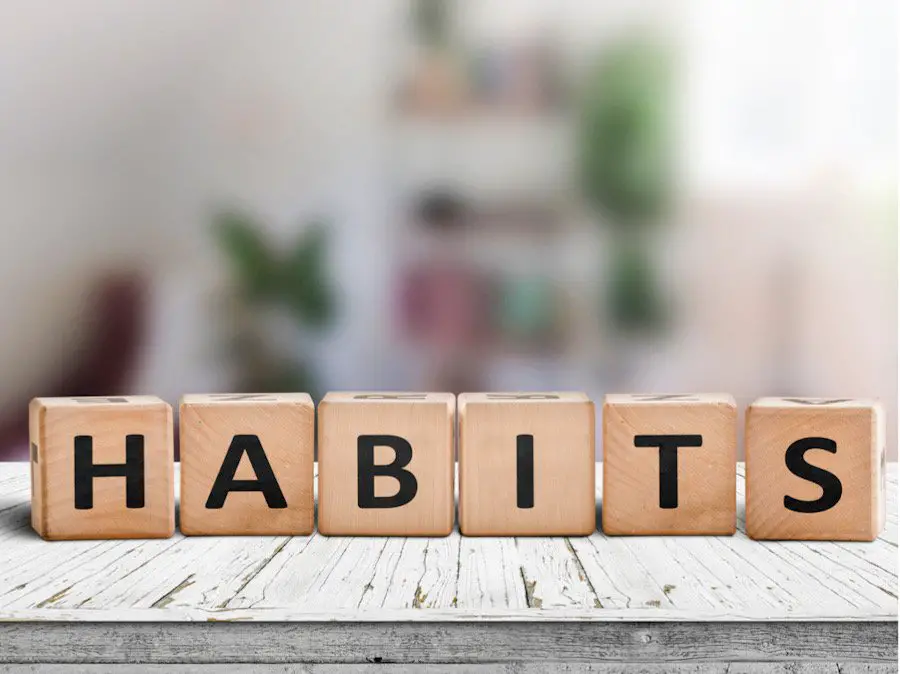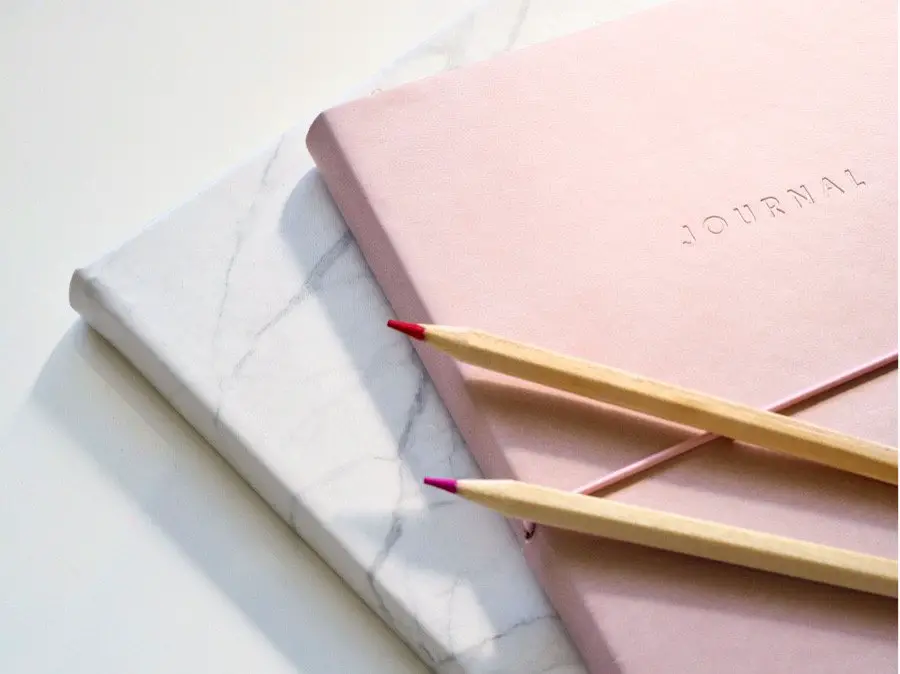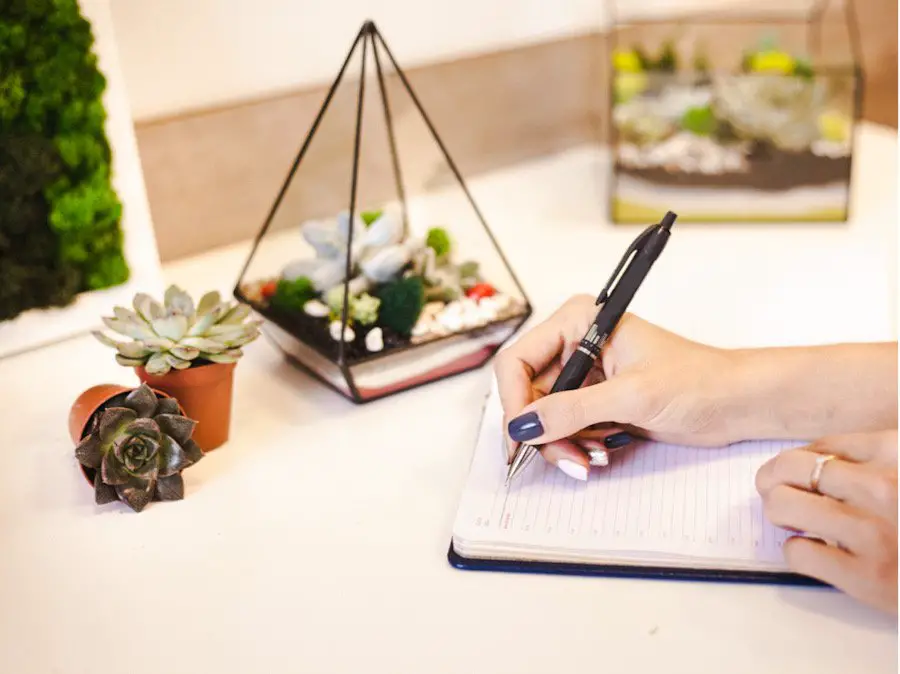The idea of writing a consistent journal sounds appealing to most people. And yet, we’re often surprised when we meet someone who does it. What got them started? How does someone journal daily?
We carry a lot of baggage around the idea of writing and often carry that with us when we want to write a consistent journal. Being a good writer is not a requirement to keep a journal.
What is required is learning how to break down any stress you have around the idea, setting yourself up for success, and deciding you actually want to learn how to journal consistently.
For many people, journaling daily becomes a keystone habit. Meaning that by doing this regularly, they become more aware of themselves, how to form daily habits, and how to stick with them. It’s part of why so many people say that a daily journal has changed their life.
Table of Contents
How to Journal Daily
Let’s dive into the real details for how to journal consistently. We’re talking about practical tips here.
Because we’re talking about practical tips, not all of them will make sense for you. I’m expecting you to read through these tips, find the ones that resonate for you, and then apply those to your daily life to build a habit.

If you’ve ever consciously built a daily habit for yourself, you may have some ideas already of what does and doesn’t work for you.
If you’ve never intentionally built a daily habit, don’t worry. It’s important to be easy on yourself and realize that people do this in many different ways. Once you effectively make a decision and build one daily habit for yourself of any kind, you’ll know more about how you work for building your next habit. Even better, journaling is a great way to get to know yourself, so you’ll learn a lot that will benefit you for future habit building exercises.
Let’s break into those practical tips for how to journal daily.
Choose the Time Of Day
When will you journal?
Would you like to write at the end of the day to clear your day? Would you most benefit from waking up and getting clear on what the day ahead will entail by writing it all down? Do you tend to be stressed in the middle of the afternoon and want to take twenty minutes to regain some calm at that time?
You have to choose the time for yourself that makes sense.
In the above example questions, it can be helpful to consider why you want to write a journal. That may help you decide.

However if that doesn’t work, start off by writing a list of what you currently do daily. You may not think of anything at first, but that’s because our habits have a convenient way of becoming background noise. When something is automated, we don’t have to think to force ourselves to do it anymore.
Examples of daily activities you may currently do include brushing your teeth, drinking your coffee, taking your kids to school, watching television, and eating meals.
Once you have a list of your daily activities and times, choose one where you could attach a new twenty minute daily journaling habit. For example, you will always journal after you brush your teeth. Or you will always journal while you drink your coffee.
By attaching your new habit to an existing one, you’ll be able to stack your habits. This is an easy trick to slide your new habit into your day without trouble.
If you are someone who uses a calendar or alarms on your phone, you can also add the new time into your phone to remind you to journal. A lot of people like setting a reminder in their phone because then they don’t have to worry about remembering or checking the time. Their phone tells them to do it, and then they do. No muss, no fuss.
Choose the Location For Journaling
You’ve chosen the time. Now choose where.
This is actually a lot more important than you might think.
If you do the same habit in the same space every day, it will get easier to let your mind go and journal. You won’t be observing what’s in the room, because the room will be familiar to you. It’s the room where you journal every day.
Some people also find it helpful to set some habits that set the mood for the room. This may include lighting a candle with a specific fragrance or drinking the same beverage. These small signals alert your mind that this is what you’re doing now, easing the transition from whatever you were doing a moment before into journaling time.
Choose Your Journaling Format
Are you going to journal on paper or digitally? Are you going to freely write your thoughts or use a bullet journal? These are topics worthy of their own detailed posts. Just know this: choose what’s right for you and know how you’re going to journal before you start your daily practice.

Knowing the logistics will help you write in your journal as opposed to thinking about it during journaling time.
If you haven’t made up your mind yet on using pen and paper or going digital, check out my article ‘Journaling: Computer Vs. Paper – Pros and Cons and How To Decide.’
Take Care of Distractions
Your time spent journaling is for you. For most of us, the day is full of times where we will be interrupted. Our attention jumps from whatever thought we were just having into the latest and greatest thing to steal our focus.
It takes you 23 minutes to recover your focus every time you’re distracted. If you’re journaling for twenty minutes, you need the full twenty minutes to stay focused and get the benefits you’re after.
Your first distraction is technology. If you’re going to journal digitally, you can still put your phone to “Do Not Disturb” so you don’t get the notifications. If you’re journaling on paper, you can definitely do the same. You may be using your phone as a timer for twenty minutes. If not, you can set your phone in the other room. I know this idea gives some people anxiety, but if you can do it, with practice, it can be surprisingly freeing.
Then comes the distraction of sounds, or even the total lack of sound.
It may be useful to put on white noise by turning on a fan. Others like to wear noise-canceling headphones while they write. You can go ahead and listen to your favorite music, but that can be distracting. Another option is to try some good background songs. This stream on YouTube plays lofi music to study to and is an easy choice to put on in the background. If you are looking for more good ideas on what you can use as background music for journaling, go ahead and check my article ‘Best Music for Journaling – Benefits, Ideas, and Resources.’
Set a Timer
To be fair, this tip is part of ‘rule out distractions.’ Without a timer, you’ll be wondering, ‘how long has it been?’ When you set a timer, you don’t need to watch the clock. You know when it’s time.
Setting a timer gives you permission to focus on what you’re doing for these twenty minutes.
Give Yourself Permission to Write Whatever

There is little room for perfectionism in journaling. That kind of pressure will have you thinking about how you don’t know what to write, or even wondering if you remember how to write at all. It’s not uncommon to tensely stare at a blank page and wonder if you’ve ever known what a sentence even is, anyway. Writing gets hard when you’re trying to make it perfect.
Your journal is just for you. Promise yourself that you’ll never let anyone else read it. And then just write.
No editing. Just go. Let it be messy! This is your safe space to do that in.
Journaling Prompts
Are you concerned about what to write? Truly, you can just write about your day. The one you just lived or what is ahead of you. This is an easy way to start.
But sometimes that doesn’t feel right.
Print off a list of journaling prompts and keep it tucked in the front of your journal. If you find yourself stuck, grab one and start writing.
The Secret To How To Journal Consistently
Do you want to know how to journal daily? Here’s the secret with all of these tips: we’re making it as stress-free as possible. By setting up all the logistics ahead of time, there is nothing for your thoughts to get caught on and stop yourself from making the step to do it.

By allowing yourself to journal however feels natural for you, you’re releasing yourself from the struggle of doing something that doesn’t feel right.
Giving yourself permission to write whatever comes to mind for twenty straight minutes lets you release all the thoughts you wouldn’t know you had if you were trying to do things the “right” way.
Is there something stressing you out about the logistics of daily journaling? Solve it before it’s time to journal. You may recognize this stress by way of a thought looping in your mind. For example, if you notice that you keep thinking in the back of your mind, ‘my pen is terrible,’ then stop and get a new pen before your next journaling session. Problem solved. Stress relieved. Journaling is happening.
Know Why You Want To Write a Consistent Journal
You may not know why you want to write a journal when you first get started. If you don’t, that’s okay. But do come back to the question occasionally. Put it on your calendar and use it as a journaling prompt a month from now.
Why does journaling matter to me? What am I hoping to get out of this? Are the ways I’m journaling supporting this goal?
When you know your why, it’s easier to stay with a habit.
Manage Your Expectations Of Results

Is writing in a daily journal amazing? Yes. Can it be life-changing? Yes. Does everyone take to it within a day of starting the habit? No.
Managing your expectations is important. You’ve probably heard many times that starting a daily journal habit could change your life. That’s a lot of expectation. That’s a lot of pressure.
Studies have shown amazing benefits to consistent journaling. There are plenty of single-person stories of results where people have finally managed to break through serious struggles in their lives, and those stories begin with their journaling habit. There are also plenty of mundane stories where a daily journaling habit helped someone relax. The impact of this should never be underestimated. If it sounds small, it isn’t.
But these kinds of results don’t often happen overnight. When journaling clicks for you, it may become an essential part of your life. It may become the foundation other habits are built on. It may help you stay organized, manage your feelings, and otherwise change your life.
When will journaling click for you? And what will your results be? That’s going to take some time to find out.
If you expect instant results, it will be very difficult to start consistently journaling every day.
If you expect that you’ll need to journal every day for thirty days and then evaluate how your new habit is working for you, you’ll have a much easier time sticking with it. You’ll also have an easier time observing the real results in your life instead of watching for the ones you expect to see happen.
The more relaxed you can approach your new daily journal, the easier it will be to let the habit build.
If you are new to journaling, definitely check out my article ‘Journaling for Beginners: A Complete Guide’ and get started right away!


